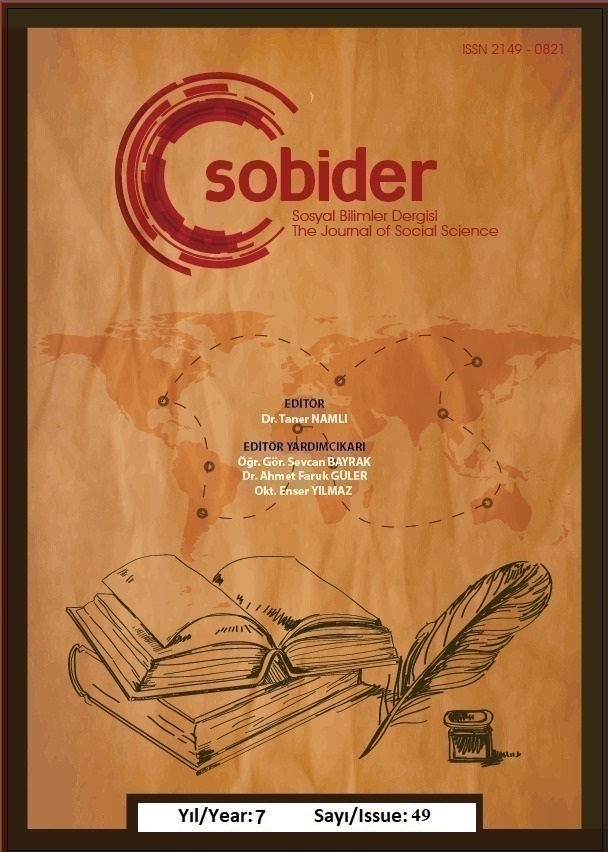Author :
Abstract
Bu çalışmanın amacı; reklam ajanslarının markalar için yaptıkları çalışmalarda etik konusu üzerine düşüncelerini ortaya koymaktır. Yöntem olarak; literatür taraması yapılmış ve ilgili olan kaynakların analizleri yapılmıştır. Aynı zamanda Türkiye’deki önde gelen reklam ajanslarıyla mülakatlar yapılmıştır. Bu kapsamda araştırma yöntemi nitel araştırma yöntemidir. Bulgular; reklam faaliyeti gösteren ajanslar, sektörde kabul görmüş belli kriterlerden ne kadar fazlasını yerine getirebiliyorlarsa o kadar başarılı iş yaptıklarını düşünmektedirler. Otokontrol olarak, genellikle marka için uğraşan ekiplerin sunumları ve müşterinin briefi ile yapılan iş üzerindeki kontrolleri belirtmektedirler. Bununla birlikte reklam çalışmasının kopyalanması sektör içinde büyük bir sorun olarak görülmektedir. Sonuç olarak; yapılan kopya çalışmalar markaya bir fayda sağlamamaktadır. Yaratıcı fikir markanın geleceği ve topluma olan sorumluluk gereği özgün olmalıdır. Çoğu ajans Türkçe kullanımına özen göstermeye çalışmakta fakat hedef kitlenin dilinden konuşabilmek adına, dilin var olan haliyle değil de sokakta konuşulan haliyle reklam yapmaktadır.
Keywords
Abstract
The aim of this study is to present the opinions of advertising agencies on ethical issues in their work for brands. As a method; the literature was searched and the relevant sources analyses were made. At the same time, interviews were conducted with leading advertising agencies in Turkey. In this context, the research method is a qualitative research method. Findings; advertising agencies think that the more information they can meet the criteria accepted in the industry, the more successful they are doing. As auto control, they often refer to the presentations of teams engaged for the brand and the controls on the work done with the customer's brief. However, copying advertising work is seen as a major problem in the industry. As a result; the copies made do not benefit the brand and the creative idea must be unique due to the future of the brand and its responsibility to the community. Most agencies try to take care of the use of Turkish, but in order to speak the language of the target audience, they advertise in a spoken on the street form rather than the language that exists.
Keywords
- Antalya Ticaret ve Sanayi Odası (2014), İş Etiği ve Ahlakı Eğitimi [online], https://www.atso.org.tr/detay/2/2/7/3772/is-etigi-ve-ahlakiegitimi.html#:~:text=Etik%20kavram%C4%B1%3B%20do%C4%9Fru%20davran%C4 %B1%C5%9F%C4%B1%2C%20yanl%C4%B1%C5%9F,eti%C4%9Fin%20evrensel% 20insani%20de%C4%9Ferlere%20dayanmas%C4%B1d%C4%B1r., Erişim Tarihi: 10/08/2020
- Copleston, F. (1997) Felsefe Tarihi: Ön-Sokratikler Ve Sokrates Çev. Aziz YARDIMLI, İdea Yayınevi, İstanbul, s.90
- Çitfçi, Köksal. (2009), Taklit İçgüdüsü ve İnsanın Görsel Serüvendeki Yeri, Grafik Tasarım, Sayı 31, s.36-41, İstanbul
- Karabük Üniversitesi Orman Fakültesi (2019), Etik Günü [online], Karabük, http://orman.karabuk.edu.tr/yuklenen/dosyalar/126520201940638.pdf, Erişim Tarihi:
- Mahmutoğlu, Abdulkadir. (2009), Etik Ve Ahlâk; Benzerlikler, Farklılıklar Ve İlişkiler, Türk İdare Dergisi, Sayı 463-464, s.225-249, Ankara
- Milliyet (2020), Replika ne demek? Replika ürün (telefon, ayakkabı, çanta vb.) ne anlama gelmektedir? [online], https://www.milliyet.com.tr/ekonomi/replika-ne-demek-replikaurun-telefon-ayakkabi-canta-vb-ne-anlama-gelmektedir-6196511, Erişim Tarihi:
- PEKDİNÇER, R.Tamer, (2014) Aldatıcı Reklam-Karşılaştırmalı Reklam Kavramları ve Tüketici Kanunu Çerçevesinde Dikkat Edilmesi Gereken Hususlar (II), The Brand Age, Sayı 61, s.104-105, İstanbul
- Reklamcılar Derneği (2020), 2019 Yıl Sonu Raporu [online], İstanbul, http://rd.org.tr/assets/uploads/Guncel_Medya_Yatirimlari_Rapor_2019.pdf, Erişim Tarihi: 07/08/2020
- TDK Güncel Türkçe Sözlük, https://sozluk.gov.tr/, Erişim Tarihi: 10/08/2020
- The Brand Age, (2010) Marka Taklitçiliği, The Brand Age, Sayı 14, s. 59-71, İstanbul
- Tuncer, A,Selim. (2012) Reklamın İyisi, The Brand Age, Sayı 39, s. 52-53, İstanbul
- Ülgen, Hayri ve Mirze, S.Kadri (2004), İşletmelerde Stratejik Yönetim, Literatür Yayıncılık, İstanbul, s.35.





